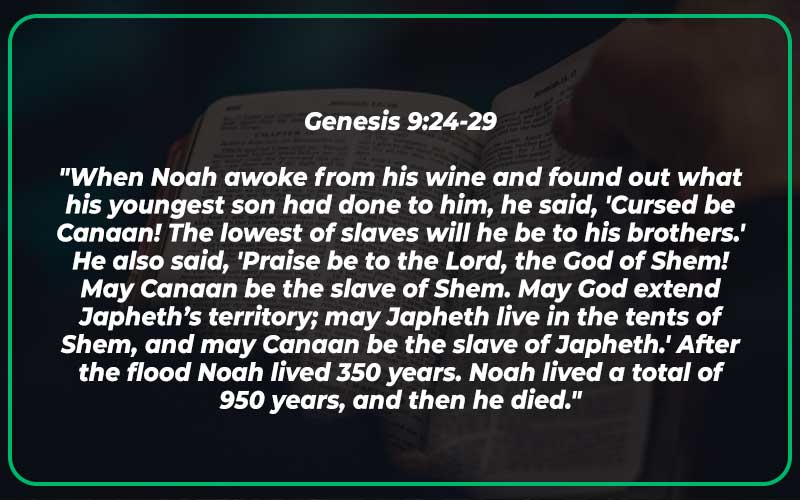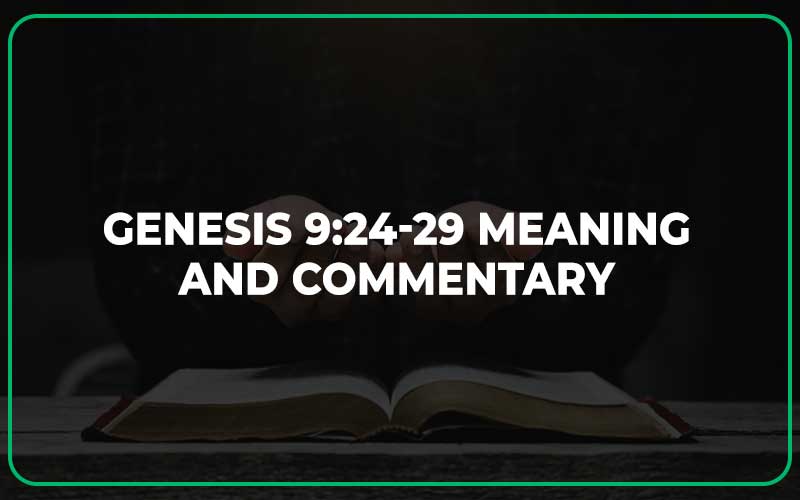Genesis 9:24-29
“When Noah awoke from his wine and found out what his youngest son had done to him, he said, ‘Cursed be Canaan! The lowest of slaves will he be to his brothers.’ He also said, ‘Praise be to the Lord, the God of Shem! May Canaan be the slave of Shem. May God extend Japheth’s territory; may Japheth live in the tents of Shem, and may Canaan be the slave of Japheth.’ After the flood Noah lived 350 years. Noah lived a total of 950 years, and then he died.”
Genesis 9:24-29 Meaning
The verses in Genesis 9:24-29 tell the story of Noah and his sons after the flood. One day, Noah became drunk and lay uncovered in his tent. Ham, one of Noah’s sons, saw his father naked and went to tell his brothers, Shem and Japheth. Shem and Japheth showed respect to their father by walking backward and covering him with a garment, without looking at his nakedness. When Noah woke up and found out what had happened, he cursed Ham’s son, Canaan, and blessed Shem and Japheth.
Explanation and Commentary on Genesis 9:24-29
In Genesis 9:24-29, we encounter the aftermath of Noah’s drunkenness. This passage illustrates a complex interplay of human frailty, familial relationships, and the consequences of our actions.
Noah, who had been righteous in the eyes of God, experienced a moment of weakness and vulnerability by becoming intoxicated with wine. His son Ham saw him in this undignified state and dishonorably shared the news with his brothers, Shem and Japheth, without showing the proper respect or concern for their father’s dignity.
Shem and Japheth, in contrast, acted with discretion and respect. They chose not to expose their father’s vulnerability and instead covered him, walking backward with a garment to cover Noah’s nakedness without looking at him directly. This gesture of respect demonstrated their honor and reverence for their father.
Noah, upon awakening and realizing what had occurred, pronounced a curse on Canaan, Ham’s son, rather than directly on Ham himself. This action has sparked various interpretations, but some suggest it reflects a way of holding Ham accountable through the consequences upon his offspring. This passage highlights the importance of familial respect and the enduring impact of our actions on future generations.
The story also teaches us about the significance of honoring and respecting our parents or elders, even in their moments of weakness or vulnerability. This principle aligns with other biblical teachings emphasizing the value of honoring parents, such as in Exodus 20:12 and Ephesians 6:2-3.
Moreover, it serves as a reminder of the potential consequences of our actions, especially concerning how we treat and respond to our family members. Respect, discretion, and grace toward our elders, even in their moments of weakness, are virtues that reflect a deep reverence for the dignity and worth of others.
As we reflect on this narrative, it prompts us to consider the complexities of human relationships and the importance of displaying honor, respect, and discretion in our interactions, particularly within our families.
Context of Genesis 9:24-29
Genesis 9:24-29 is part of the broader narrative of the biblical book of Genesis, specifically within the larger account of Noah and the aftermath of the Great Flood. After the deluge that wiped out humanity due to widespread corruption and sin, Noah and his family were the only survivors. Following their exit from the ark, God made a covenant with Noah, promising never to destroy the earth by flood again and establishing the rainbow as a sign of this covenant.
This passage occurs after the covenant is made, highlighting an incident involving Noah’s vulnerability and the response of his sons. Noah, who had survived the cataclysmic flood and been deemed righteous by God, became intoxicated from wine. In his state of inebriation, he lay uncovered in his tent.
Here, Noah’s son Ham saw his father in this vulnerable state and dishonorably shared this information with his brothers, Shem and Japheth. Instead of joining in the disrespectful behavior, Shem and Japheth chose to cover their father’s nakedness without looking at him directly, displaying reverence and respect.
Upon awakening and learning of what had happened, Noah pronounced a curse, not directly on Ham but on Ham’s son Canaan. This passage serves as a reminder of the importance of honoring parents, the consequences of disrespect, and the complexities of familial relationships.
It’s a story that reflects human frailty, the significance of respect within families, and the repercussions of our actions, even within the context of divine favor and covenantal relationships established by God.

Breaking Down the Key Parts of Genesis 9:24-29
Noah’s drunkenness: This shows Noah’s human weakness and serves as a reminder that even those chosen by God can make mistakes.
Ham’s actions: Ham’s disrespectful behavior highlights the importance of honoring our parents and showing them proper respect.
Shem and Japheth’s response: By covering their father respectfully, Shem and Japheth exemplify the right way to honor and show reverence to their parents.
Noah’s curse: Noah’s curse on Canaan emphasizes the consequences of disrespect and dishonor within the family.
Bible Study on Genesis 9:24-29
These Bible verses offer several important lessons for our lives as Christians. First, they remind us that no one is perfect, and even the most faithful servant of God can stumble. Therefore, it is crucial to remain vigilant and guard ourselves against situations and temptations that could lead us astray.
Secondly, the story emphasizes the significance of honoring our parents. As children of God, we are called to show respect and love to our earthly parents as a reflection of our relationship with our Heavenly Father. We should treat them with honor, seek to understand their perspective, and demonstrate appreciation for their guidance and sacrifice.
Additionally, this passage highlights the importance of discretion and humility. Shem and Japheth’s respectful response shows their maturity and their ability to handle a difficult situation with wisdom and grace. We can learn from their example by making sure to handle sensitive matters with care and respect for others.
Finally, the curse placed on Canaan serves as a reminder that our actions have consequences. Disrespecting and dishonoring our parents can have lasting effects, not only on ourselves but also on future generations. This reinforces our need to cultivate healthy and loving relationships within our families.
Also Read: Genesis 9:14-17 Meaning and Commentary
Biblical Translations of Genesis 9:24-29
Genesis 9:24-29 King James Version (KJV)
“And Noah awoke from his wine, and knew what his younger son had done unto him. And he said, ‘Cursed be Canaan; a servant of servants shall he be unto his brethren.’ And he said, ‘Blessed be the LORD God of Shem; and Canaan shall be his servant. God shall enlarge Japheth, and he shall dwell in the tents of Shem; and Canaan shall be his servant.’ And Noah lived after the flood three hundred and fifty years. And all the days of Noah were nine hundred and fifty years: and he died.”
Genesis 9:24-29 English Standard Version (ESV)
“When Noah awoke from his wine and knew what his youngest son had done to him, he said, ‘Cursed be Canaan; a servant of servants shall he be to his brothers.’ He also said, ‘Blessed be the Lord, the God of Shem; and let Canaan be his servant. May God enlarge Japheth, and let him dwell in the tents of Shem, and let Canaan be his servant.’ After the flood Noah lived 350 years. All the days of Noah were 950 years, and he died.”
Genesis 9:24-29 New American Standard Bible (NASB)
“When Noah awoke from his wine, he knew what his youngest son had done to him. So he said, ‘Cursed be Canaan; a servant of servants he shall be to his brothers.’ He also said, ‘Blessed be the Lord, the God of Shem; and let Canaan be his servant. May God enlarge Japheth, and let him dwell in the tents of Shem; and let Canaan be his servant.’ Noah lived 350 years after the flood. So all the days of Noah were 950 years, and then he died.”
Genesis 9:24-29 New King James Version (NKJV)
“So Noah awoke from his wine, and knew what his younger son had done to him. Then he said: ‘Cursed be Canaan; a servant of servants he shall be to his brethren.’ And he said: ‘Blessed be the Lord, the God of Shem, and may Canaan be his servant. May God enlarge Japheth, and may he dwell in the tents of Shem; and may Canaan be his servant.’ And Noah lived after the flood three hundred and fifty years. So all the days of Noah were nine hundred and fifty years; and he died.”
Genesis 9:24-29 New Living Translation (NLT)
“When Noah woke up from his stupor, he learned what Ham, his youngest son, had done. Then he cursed Canaan, the son of Ham: ‘May Canaan be cursed! May he be the lowest of servants to his relatives.’ Then Noah said, ‘May the Lord, the God of Shem, be blessed, and may Canaan be his servant! May God expand the territory of Japheth! May Japheth share the prosperity of Shem, and may Canaan be his servant.’ After the flood, Noah lived another 350 years. He lived 950 years in all, and then he died.”
Genesis 9:24-29 The Message (MSG)
“Noah woke up from his wine stupor and learned what his youngest son had done to him. He said, ‘Cursed be Canaan! Servant of servants, he’ll be to his brothers.’ He also said, ‘Blessed be God, the God of Shem, but Canaan shall be his slave. God prosper Japheth, living spaciously in the tents of Shem. But Canaan shall be his slave.’ Noah lived another 350 years following the flood. He lived a total of 950 years. And he died.”
Final Thoughts
The story of Noah and his sons reminds us of our humanity and the potential for both righteousness and failure within us. It shows that even when we stumble, God’s grace and forgiveness can restore us.
We must strive to honor our parents and show them the love and respect they deserve. Let us seek to imitate Shem and Japheth’s wisdom, showing sensitivity and humility in our interactions with others. By doing so, we can foster healthy relationships and positively impact the generations to come.

